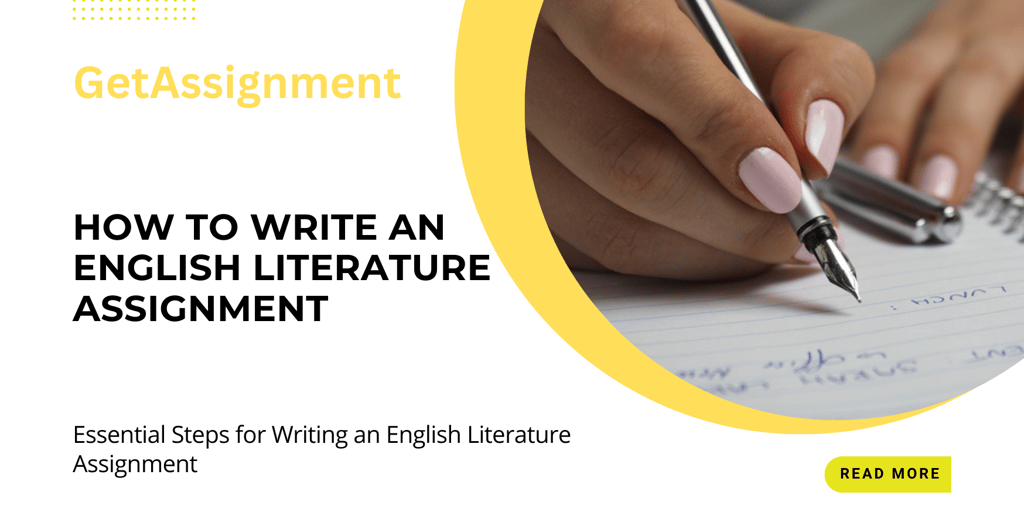How to Write an English Literature Assignment
The process of writing an English literature assignment involves several key steps. Understanding the assignment requirements, choosing a relevant topic, conducting thorough research, crafting a strong thesis statement, organizing your writing effectively, incorporating evidence and analysis, editing and proofreading meticulously, citing sources accurately, and finalizing the assignment with attention to detail are all essential aspects. By following this comprehensive guide, students can produce a high-quality and impactful piece of academic writing that showcases their understanding and engagement with the world of English literature.
Admin
3/22/20243 min read


Writing an English literature assignment can be an enriching experience that allows students to delve deep into the world of literary analysis, critical thinking, and creative expression. Whether you're tasked with an essay, research paper, or literary analysis, mastering the art of writing in this field requires a combination of academic rigour, insightful interpretation, and effective communication. This comprehensive guide provides step-by-step instructions and tips on how to write an English literature assignment that is engaging, well-structured, and academically sound.
Understanding the Assignment Requirements
The first and most crucial step in writing an English literature assignment is to thoroughly understand the requirements and expectations set forth by your instructor or academic institution. Carefully read the assignment prompt, guidelines, and any accompanying materials to grasp the scope, objectives, and specific tasks involved. Pay attention to the topic, format, length, citation style, and deadlines specified in the assignment instructions.
Choosing a Topic
Selecting a compelling and relevant topic is essential to the success of your English literature assignment. Consider your interests, knowledge base, and the scope of the assignment when choosing a topic. You may opt to focus on a particular literary work, author, theme, genre, historical period, or critical approach. Ensure that your chosen topic is specific enough to be manageable within the confines of your assignment while also allowing for meaningful analysis and exploration.
Conducting Research
Research serves as the foundation of any well-written English literature assignment. Utilize a variety of sources such as books, scholarly articles, literary journals, databases, and reputable websites to gather information and support your analysis. Take detailed notes, annotate texts, and organize your research materials effectively. Pay attention to critical interpretations, historical contexts, literary techniques, and scholarly debates related to your chosen topic.
Crafting a Thesis Statement
A strong thesis statement is the cornerstone of your English literature assignment, providing a clear and concise overview of your main argument or analysis. Your thesis should be debatable, specific, and relevant to your chosen topic. It should encapsulate the central theme, question, or insight that you will explore and support throughout your assignment. Take time to refine and articulate your thesis statement before proceeding with your writing.
Structuring Your Assignment
Organize your English literature assignment in a coherent and structured manner to ensure clarity and readability. Follow a typical academic essay structure that includes an introduction, body paragraphs, and a conclusion. In the introduction, provide background information, contextualize your topic, and present your thesis statement. Use the body paragraphs to develop your arguments, analysis, and supporting evidence in a logical and organized fashion. Each paragraph should focus on a distinct idea or aspect related to your thesis. Use transitions and topic sentences to ensure smooth flow and coherence between paragraphs. Conclude your assignment by summarizing your main points, restating your thesis, and offering insights or implications of your analysis.
Writing Style and Tone
When writing your English literature assignment, adopt a formal and academic writing style appropriate for the subject matter. Use clear, concise language and avoid unnecessary jargon or colloquialisms. Demonstrate your understanding of literary concepts, theories, and terminology while also engaging your reader with insightful analysis and interpretation. Maintain a consistent tone throughout your assignment, balancing objectivity with critical engagement and personal reflection.
Incorporating Evidence and Analysis
Support your arguments and analysis with relevant evidence from literary texts, scholarly sources, and critical perspectives. Incorporate quotations, paraphrases, and textual references to illustrate your points and demonstrate a deep understanding of the material. Analyze literary devices, themes, characters, settings, and narrative techniques to uncover layers of meaning and offer nuanced interpretations. Critically evaluate conflicting viewpoints or interpretations to strengthen your analysis and argumentation.
Editing and Proofreading
After completing your initial draft, take time to edit and revise your English literature assignment. Proofread for grammar, punctuation, spelling errors, and clarity of expression. Ensure that your writing is concise, coherent, and free from any inconsistencies or ambiguities. Check for logical progression, coherence, and adherence to the assignment requirements. Seek feedback from peers, instructors, or writing centres to gain different perspectives and improve the overall quality of your assignment.
Citing Sources and References
Accurately cite all sources and references used in your English literature assignment according to the specified citation style (e.g., MLA, APA, Chicago). Include in-text citations for direct quotations, paraphrases, and ideas borrowed from external sources. Create a bibliography or works cited page that lists all sources consulted in your research. Follow the formatting guidelines for citations and references as per the designated style guide.
Finalizing Your Assignment
Before submitting your English literature assignment, review all requirements, guidelines, and formatting instructions one final time. Make any necessary revisions or improvements based on feedback or self-assessment. Ensure that your assignment is well-structured, thoroughly researched, effectively argued, and free from errors. Proofread your work meticulously to catch any overlooked mistakes. Submit your assignment by the specified deadline, allowing time for final checks and revisions if needed.
In conclusion, writing an English literature assignment requires careful planning, research, analysis, and writing skills. By understanding the assignment requirements, choosing a compelling topic, conducting thorough research, crafting a strong thesis statement, organizing your writing effectively, incorporating evidence and analysis, editing and proofreading diligently, citing sources accurately, and finalizing your assignment with attention to detail, you can produce a high-quality and impactful piece of academic writing that demonstrates your understanding and engagement with the rich and diverse world of English literature.
